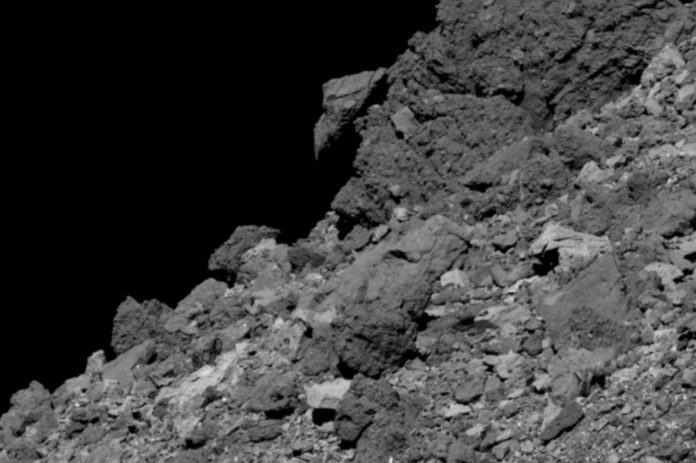The rocks on the surface of the asteroid Bennu act as armor, protecting it from small meteors.
This is the conclusion that may be drawn from the observations of craters that were made by NASA’s OSIRIS-REx (Origins, Spectral Interpretation, Resource Identification, Security-Regolith Explorer) spacecraft.
“These observations give new insight into how asteroids like Bennu respond to energetic impacts,” says Edward (Beau) Bierhaus, lead author of a paper published in the journal Nature Geoscience.
Bennu is referred to as a “rubble pile” asteroid because it developed from the fragments of a larger asteroid that was destroyed by an impact in the distant past. Bennu was formed when fragments from the impact amalgamated under their own weak gravity.
To analyze craters on Bennu, the researchers employed global data sets with unprecedented high resolution: images from the OSIRIS-REx Camera Suite and surface-height data (topography) from the OSIRIS-REx Laser Altimeter, a laser-ranging (lidar) instrument on the mission.
“Measuring craters and their population on Bennu was exceptionally exciting,” adds David Trang, co-author. “At Bennu, we discovered something unique to small and rocky bodies, which expanded our knowledge of impacts.”
The abundance and size of craters can be used by planetary scientists to assess the age of surfaces. Impact craters build up over time, therefore a surface with a lot of craters is older than one with few. In addition, the size of the crater is determined by the size of the impactor; larger impactors produce larger craters. As small meteoroids are significantly more common than large ones, astronomical objects such as asteroids often have far smaller craters than large ones.
The number of craters in Bennu’s larger craters follows this trend, with the number of craters decreasing as the size of the crater grows. The tendency, however, is backwards for craters smaller than 6.6 to 9.8 feet (approximately 2 – 3 meters) in diameter, with the frequency of craters reducing as their size decreases. This suggests that something strange is going on on Bennu’s surface.
Researchers think that Bennu’s many boulders act as a shield, stopping craters from being made by many small meteorites. Rather than shattering the boulders, these impacts are more likely to chip and fracture them. In addition, impactors that make it through the boulders leave smaller craters than they would if Bennu’s surface was covered with smaller, more regular particles, such as sand.
This activity impacts Bennu’s surface differently than that of objects with fine-grained or solid surfaces.
“The displacement or disruption of an individual or small group of boulders by a small impact is probably one of the most fast-acting processes on a rubble-pile asteroid’s surface. On Bennu, this contributes to making the surface appear to be many times younger than the interior,” Bierhaus adds.
Image Credit: NASA
You were reading: Scientists Think Loose Rock Acts As Shield For Asteroid Bennu
